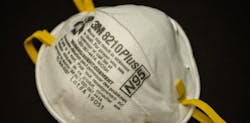Industry Group Coalition Supports Reshoring PPE Manufacturing
On July 20, a coalition of 21 groups asked the U.S. government to support efforts to invest in domestic production of PPE, or personal protection equipment. The coalition included several manufacturing trade groups and unions, including the AFL-CIO, the Alliance for American Manufacturing, the American Iron and Steel Institute, and the American Steelworkers.
According to the group, the novel coronavirus pandemic was the impetus for the directive, and cited a “strong bipartisan consensus” that the United States should fund domestic means of sourcing medical supplies. “Our continuing reliance on foreign sources for these vital public health resources is a severe vulnerability to both our public health and national security,” the directive reads.
In addition to calling for financial incentives for private purchases of U.S.-made PPE and federal grants for companies that repurposed their facilities and supply chains to manufacture PPE, the coalition called for new rules for federal PPE purchases similar to the Berry Amendment. The Berry Amendment restricts the Department of Defense from purchasing certain kinds of goods—especially food, textiles, and recently, flatware— that were not grown, reprocessed, reused, or produced in the United States.
“New federal government domestic purchasing requirements for PPE will create the stable demand for U.S.-made PPE that will incentivize investment in domestic PPE manufacturing,” said the statement. In a separate request, the letter writers advocated that the Berry Amendment itself needs refurbishing: “Congress must permanently re-set the Berry threshold to $150,000 and eliminate loopholes for foreign-made products,” it said.
The authors of the letter also said the Strategic National Stockpile must be “better prepared” to respond to a public health emergency in the future. The stockpile, they wrote, should “conduct critical domestic supply chain mapping to identify gaps in the supply chain and develop recommendations to meet existing and future supply chain needs.”
The following groups signed off on the joint statement:
• AFL-CIO
• Alliance for American Manufacturing
• American Iron and Steel Institute
• American Sheep Institute
• Coalition for a Prosperous America
• Georgia Association of Manufacturers
• Hand Tools Institute
• INDA: Association of the Nonwoven Fabrics Industry
• Narrow Fabrics Institute
• National Cotton Council
• National Council of Textile Organizations
• Parachute Industry Association
• Rhode Island Textile Innovation Network
• SEAMS: Association of the U.S. Sewn Products Industry
• SEIU
• South Carolina Textile Council
• U.S. Industrial Fabrics Institute
• United States Footwear Manufacturers Association
• United Steelworkers
• Warrior Protection and Readiness Coalition
• Workers United/SEIU
In April, President Trump sharply criticized 3M Co., a major manufacturer of paper-based N95 filter masks, for making masks in the United States and exporting them to other countries. On April 7, the White House and 3M came to a deal that saw the manufacturing conglomerate agree to import 166.5 respirator units from overseas production facilities to the United States.
About the Author
IW Staff
Find contact information for the IndustryWeek staff: Contact IndustryWeek
